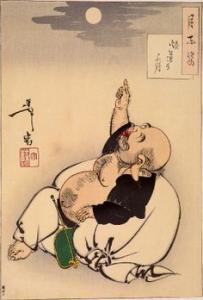Original Awakening is central to the Zen Way.
From one angle, original awakening, from another sunyata, from still another the one, or the great empty. The mystery that is our being.
It is the wondrous proclamation that we are all of us connected, and that our true heritage is awakening.
There are critiques of original awakening asserting that it is antinomianism, that is it teaches no morality. Which I note are pretty much the same criticisms against early Nineteenth Century Universalists, who as they didn’t believe in a hell were considered by many to be unfit to sit on a jury.
Although, while I can’t speak to the specifics of those Nineteenth Century Universalists, I do know that there are those including people who claim to be Zen teachers who appeal to our original awakening, emptiness, the one, to justify what is often unjustifiable. This ranges from relatively harmless sophistries like saying celibacy and having sex within marriage are the same to a host of genuinely harmful abuses, sexual, financial, and other. Now, our original awakening doesn’t mean we are not immune to the play of cause and effect, that’s a different point. But, those who justify selfish behaviors, small or great, by appeal to original awakening cheapen the gift, and mislead people. And imply they have not actually met our original awakening, our original face.
In fact within the mystery of our interconnectedness discovered as the truth of who we are, a whole ethic arises. Now, there is something that precedes that sense of response. And it cannot be ignored anymore than taking our original awakening as a get-out-of-jail-free card. But taken whole, the way of original awakening is the path of intimacy. And for those who have experienced this rather than simply embraced it as a philosophy, the path of intimacy is immediately noticed as a path of care.
For those with a penchant to salvation by bibliography, here is a small reading list.
Original awakening was first written about in the Awakening of Faith in the Mahayana attributed to Ashvagosha, somewhere around the birth of Jesus. And this teaching of our original awakening is profoundly explored within another text, the Flower Ornament Sutra, a document that has parts that appear to date from the beginning of our common era but were not completed until the end of the third or perhaps even the beginning of the fourth century.
However, speaking of stories, original awakening is the central theme in the Platform Sutra of the Sixth Ancestor, a Chinese text whose earliest versions date from the eighth century but was continuously tweaked right through the thirteenth century. You want a good book to read, this is the one I recommend: The Platform Sutra of the Sixth Ancestor, available today in several translations. Red Pine’s is probably the most readable, and Philip Yampolsky’s, particularly with his annotations, the most scholarly.
But, then, finally for me, this profound insight of our original awakening is presented compellingly within the great anthologies of spiritual anecdotes we call koan. The first are the twelfth century collection, the Blue Cliff Record, followed by the two thirteenth century collections, the Book of Serenity, and my personal favorite the Gateless Gate.
Koans (for a deeper investigation, here) use stories to help us drop our attachment to stories, to see through them, and, well, to taste water and know for ourselves whether it is cool or warm. And in that taste we can discover for ourselves the truth of our original awakening.
In formal koan introspection practice at some point we re-engage Zen’s precepts and learn how they are not so much rules, but expressions of that original awakening.
The play of our lives, the way of wisdom.














